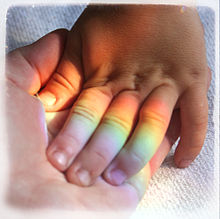Compassion
Compassion is empathic or emotional understanding of the suffering and emotions of others. It is regarded as a fundamental aspect of human love, a cornerstone of social interconnection and humanism, and foundational to the highest principles of ethical philosophy, society, and personhood.
Quotes
[edit]







A
[edit]- Oh! while we would have our young sisters imitate, as they cannot fail to love, the conduct of Ruth, will not their elders do well to ponder on, and imitate, the tenderness of Naomi? […] Would we have our daughters Ruths, we must be Naomis.
- Grace Aguilar, The Women of Israel (London: R. Groombridge and Sons, 1845), Vol. I, pp. 356, 358.
B
[edit]- Arrest each unloving thought; stamp out each critical action, and teach yourself to love all beings - not in theory but in deed and in truth.
- Alice Bailey, Discipleship in the New Age (1944)
- Because They had reached this level and mounted even higher, the great Founders of religions have ever been marked by Their overwelling compassion and tenderness, ministering to the physical as well as to the inner wants of men, to every man according to his need. p.173
- Annie Besant, The Ancient Wisdom (1897)
- Let a soul radiate in every direction love and compassion, and thoughts of hatred can find nothing to which they can attach themselves. p. 273
- Annie Besant, The Ancient Wisdom (1897)
D
[edit]- Never apologize for showing feeling, my friend. Remember that when you do so, you apologize for truth.
- Benjamin Disraeli, Contarini Fleming : A Psychological Autobiography (1832), p. 45; sometimes paraphrased: "Never apologize for showing feeling. When you do so, you apologize for the truth."
E
[edit]- A human being is a part of the whole, called by us “Universe,’ a part limited in time and space. He experiences himself, his thoughts and feelings as something separated from the rest — a kind of optical delusion of his consciousness. This delusion is a kind of prison for us, restricting us to our personal desires and to affection for a few persons nearest to us. Our task must be to free ourselves from this prison by widening our circle of compassion to embrace all living creatures and the whole nature in its beauty.
- Albert Einstein in Condolence letter to Norman Salit, (4 March 1950); also quoted in "The Einstein Papers. A Man of Many Parts" in The New York Times (29 March 1972)
- But whoever has the material possessions of this world and sees his brother in need and yet refuses to show him compassion, in what way does the love of God remain in him? Little children, we should love, not in word or with the tongue, but in deed and truth.
F
[edit]- I have very strongly of late the wish that others may be as sensitive as myself and the fear that they will not be. Colleague Sir Frank Adcock stumped by the sunset-portent unheeding. And I can't arge that I gain, or that others would gain, anything for humanity by observing and recording what went on for a few moments in the sky on Boar Race evening. I sometimes pretend to myself that I am public-spirited. I am not. I am an hedonist who wants pleasant sensations. On the other hand I am not the usual type of hedonist, for I want sensations to be had – if not by myself, then by someone else. The show shouldn't end with my death, which becomes a minor boo-hoo.
- E. M. Forster, Commonplace Book (1959), p. 211.
G
[edit]- Compassion and tolerance are not a sign of weakness, but a sign of strength.
- Tenzin Gyatso, 14th Dalai Lama, as quoted in Words Of Wisdom: Selected Quotes by His Holiness the Dalai Lama (2001) edited by Margaret Gee, p. 71.
- From my own limited experience I have found that the greatest degree of inner tranquility comes from the development of love and compassion. The more we care for the happiness of others, the greater our own sense of well-being becomes. Cultivating a close, warm-hearted feeling for others automatically puts the mind at ease. This helps remove whatever fears or insecurities we may have and gives us the strength to cope with any obstacles we encounter. It is the ultimate source of success in life.
- Ultimately, the reason why love and compassion bring the greatest happiness is simply that our nature cherishes them above all else. The need for love lies at the very foundation of human existence. It results from the profound interdependence we all share with one another.
- I believe that at every level of society - familial, tribal, national and international - the key to a happier and more successful world is the growth of compassion. We do not need to become religious, nor do we need to believe in an ideology. All that is necessary is for each of us to develop our good human qualities. I try to treat whoever I meet as an old friend. This gives me a genuine feeling of happiness. It is the practice of compassion
- Treat people as if they were what they ought to be and you help them to become what they are capable of being.
- Johann Wolfgang von Goethe, as quoted in My Country Vol. 2, No. 3 (September 1968) by Litchfield Historical Society, p. 23.
- Krishna asserts that generosity (dana) and compassion (daya) are qualities that arise 'from me alone'.
- Baghavad Gita, cited in Rajiv Malhotra: Indra's Net. p. 183
H
[edit]- A religious man is a person … whose greatest passion is compassion.
- Abraham Joshua Heschel, in New York Journal-American (5 April 1963).
- Compassion is probably the only antitoxin of the soul. Where there is compassion even the most poisonous impulses remain relatively harmless. One would rather see the world run by men who set their hearts on toys but are accessible to pity, than by men animated by lofty ideals whose dedication makes them ruthless. In the chemistry of man's soul, almost all noble attributes — courage, honor, hope, faith, duty, loyalty, etc. — can be transmuted into ruthlessness. Compassion alone stands apart from the continuous traffic between good and evil proceeding within us.
- Eric Hoffer, The Passionate State Of Mind, and Other Aphorisms (1955), section 139.
- IT IS compassion rather than the principle of justice which can guard us against being unjust to our fellow men.
- Eric Hoffer, The Passionate Sate of Mind and Other Aphorisms (1955), section 140.
- Men are only great as they are kind.
- Published as a "Roycroft Motto" in Little Journeys to the Homes of Great Musicians (1901) by Elbert Hubbard, p. 105
I
[edit]- ‘It is the heart’s burning for the sake of the entire creation, for men, for birds, for animals, for demons, and for every created thing; and at the recollection and sight of them, the eyes of a merciful man pour forth abundant tears. From the strong and vehement mercy that grips his heart and from his great compassion, his heart is humbled and he cannot bear to hear or to see any injury or slight sorrow in creation. For this reason he offers up prayers with tears continually even for irrational beasts, for the enemies of the truth, and for those who harm him, that they be protected and receive mercy. And in like manner he even prays for the family of reptiles, because of the great compassion that burns without measure in his heart in the likeness of God.’
- Isaac of Nineveh, Homily 71 in The Ascetical Homilies of Saint Isaac the Syrian, second edition (2011), published by the Holy Transfiguration Monastery, Brookline, MA. p. 491.
J
[edit]- I will show mercy to whomever I will show mercy, and I will show compassion to whomever I will show compassion.
M
[edit]- We have no compassion and we ask no compassion from you. When our turn comes, we shall not make excuses for the terror.
- Karl Marx, Suppression of the Neue Rheinische Zeitung, Neue Rheinische Zeitung No. 301, May 1849
- The whole idea of compassion is based on a keen awareness of the interdependence of all these living beings, which are all part of one another, and all involved in one another.
- Thomas Merton, in his final address, during a conference on East-West monastic dialogue, delivered just two hours before his death (10 December 1968), quoted in Religious Education, Vol. 73 (1978), p. 292.
- Compassion in the highest degree is the divinest form of religion.
- Alice Meynell, "Introductory Note" to The Poetry of Pathos & Delight: From the Works of Coventry Patmore; Passages Selected by Alice Meynell (London: William Heinemann, 1906), p. xi.
O
[edit]- Intense suffering may be a private, internal phenomenon, often hidden from the gaze or awareness of others, but it is the most viscerally overwhelming experience there is, pleading desperately for relief. There is nothing else that has greater urgency than preventing or relieving intense suffering – of human beings and, indeed, of any sentient beings capable of suffering. It is the single most important goal of a compassionate society.
- The Organisation for the Prevention of Intense Suffering (OPIS), "Ending the Agony: Access to Morphine as an Ethical and Human Rights Imperative" (2018)
P
[edit]- Compassion is when you care enough to help someone with their problem and take time to find out what's bothering 'em.
- 321 Penguins!, Fidgel
- I dread to think of a society devoid of love, compassion and humanity.
- Suman Pokhrel, I dread to think of a society devoid of love, compassion and humanity, (An interview with Romain Molina)
Q
[edit]- And then being among those who believed and advised one another to patience and advised one another to compassion.
- Quran 90:17
R
[edit]- Responding to evil
A superior being does not render evil for evil,
this is the maxim one should observe;
the ornament of virtuous persons is their conduct.
(...)
A noble soul will ever exercise compassion
even towards those who enjoy injuring others.- Ramayana 6.115, Valmiki (Abridged, Translator: Roderick Hindery)
- Go to the center of your inner being. Radiate peace in every direction. A compassionate heart radiates rays of beauty that removes the clouds of million hearts.
- Amit Ray Walking the Path of Compassion (2015)
- A selfish person condemns himself to dreadful loneliness and complete oblivion. Happiness is in giving love; and happier is the one who loves rather than the one who is loved. When this truth is realized, all happiness will materialize. Therefore, learn how to love, become accustomed to love everything beautiful, and develop active compassion toward everything that is not yet perfect. Be kind and polite to your subordinates...
- Helena Roerich Letters of Helena Roerich I, 21 August 1931
- The heart of an Arhat is like the heart of Cosmos. The heart of an Arhat is like the fire of the Sun. Eternity and the motion of Cosmos fill the heart of the Arhat. Maitreya is coming, radiant with all fires. His Heart flames with compassion for destitute humanity.
- Helena Roerich Letters of Helena Roerich I, 13 October 1929
- We all, thank goodness, feel a natural spark of sympathy for the sufferings of others. We need to catch that spark and fan it into a fire of rational and universal compassion.
- Richard D. Ryder, "All beings that feel pain deserve human rights" (2005), The Guardian
S
[edit]- Boundless compassion for all living beings is the surest and most certain guarantee of pure moral conduct, and needs no casuistry. Whoever is filled with it will assuredly injure no one, do harm to no one, encroach on no man's rights; he will rather have regard for every one, forgive every one, help every one as far as he can, and all his actions will bear the stamp of justice and loving-kindness. … In former times the English plays used to finish with a petition for the King. The old Indian dramas close with these words: "May all living beings be delivered from pain." Tastes differ; but in my opinion there is no more beautiful prayer than this.
- Arthur Schopenhauer, On the Basis of Morality (1840), trans. Arthur Brodrick Bullock, London: Swan Sonnenschein, 1903, Part III, Ch. VIII, 4, pp. 213-214.
- Until he extends the circle of his compassion to all living things, man will not himself find peace.
- Albert Schweitzer, Kulturphilosophie (1923)
- In the just and generous heart, the humble and the weak inspire compassion, and call for pity and forbearance.
- William Davis Shipman, as quoted in the Worcester Aegis and Transcript; December 7, 1861; pg. 1, col. 6.
- There never was any heart truly great and generous that was not also tender and compassionate.
- Robert South, Sermons Preached upon Several Occasions (Philadelphia: Sorin & Ball, 1844), Vol. I, p. 183.
- To become wholly compassionate requires us to open our eyes and hearts, to behold the pain and exploitation our culture obscures, to arouse deadened emotions, and to rise above our egos.
- Joanne Stepaniak, Being Vegan: Living with Conscience, Conviction, and Compassion (Los Angeles: Lowell House, 2000), p. 52.
- The lion who lives a life of compassion will receive it.
- Sumerian proverb, Collection V at The Electronic Text Corpus of Sumerian Literature, 3rd millennium BCE.
- Note: in ancient Mesopotamia, the lion was regarded as a symbol of kingship.
- It is not sufficient to have compassion only for those who are cute.
- Richard Summerbell, Abnormally Happy (1985).
T
[edit]- I could see their woe and sadness, and I pledged to ease their pain; their suffering would not be in vain.
- The Prince and the Pauper, play based on the story by Mark Twain
V
[edit]- Compassion is when you see that someone needs help and you wanna help 'em.
- Veggietales, Pa Grape.
Dictionary of Burning Words of Brilliant Writers (1895)
[edit]- Quotes reported in Josiah Hotchkiss Gilbert, Dictionary of Burning Words of Brilliant Writers (1895).
- When death, the great Reconciler, has come, it is never our tenderness that we repent of, but our severity.
- George Eliot, p. 578.
- I was never fit to say a word to a sinner, except when I had a broken heart myself.
- Edward Payson, p. 579.
See also
[edit]External links
[edit]Virtues
Altruism • Asceticism • Beneficence • Benevolence • Bravery • Carefulness • Charity • Cheerfulness • Cleanliness • Common sense • Compassion • Constancy • Courage • Dignity • Diligence • Discretion • Earnestness • Faith • Fidelity • Forethought • Forgiveness • Friendship • Frugality • Gentleness • Goodness • Grace • Gratitude • Holiness • Honesty • Honor • Hope • Hospitality • Humanity • Humility • Integrity • Intelligence • Justice • Kindness • Love • Loyalty • Mercy • Moderation • Modesty • Optimism • Patience • Philanthropy • Piety • Prudence • Punctuality • Poverty • Purity • Self-control • Simplicity • Sincerity • Sobriety • Sympathy • Temperance • Tolerance
Vices
Aggression • Anger • Apathy • Arrogance • Bigotry • Contempt • Cowardice • Cruelty • Dishonesty • Drunkenness • Egotism • Envy • Evil speaking • Gluttony • Greed • Hatred • Hypocrisy • Idleness • Ignorance • Impatience • Impenitence • Ingratitude • Inhumanity • Intemperance • Jealousy • Laziness • Lust • Malice • Neglect • Obstinacy • Philistinism • Prejudice • Pretension • Pride • Recklessness • Self-righteousness • Selfishness • Superficiality • Tryphé • Unkindness • Usury • Vanity • Worldliness
Emotions
Adoration ~ Affection ~ Agony ~ Amusement ~ Anger ~ Anguish ~ Anxiety ~ Apathy ~ Awe ~ Boredom ~ Calmness ~ Cheerfulness ~ Compassion ~ Contempt ~ Contentment ~ Depression ~ Desire ~ Disappointment ~ Discontent ~ Disgust ~ Ecstasy ~ Embarrassment ~ Empathy ~ Enthusiasm ~ Envy ~ Euphoria ~ Fear ~ Gratitude ~ Grief ~ Guilt ~ Happiness ~ Hatred ~ Hope ~ Hostility ~ Humiliation ~ Impatience ~ Indignation ~ Insecurity ~ Jealousy ~ Joy ~ Loneliness ~ Loss ~ Love ~ Lust ~ Malice ~ Melancholy ~ Nostalgia ~ Panic ~ Passion ~ Pity ~ Pride ~ Rage ~ Regret ~ Remorse ~ Resentment ~ Sadness ~ Shame ~ Sorrow ~ Suffering ~ Surprise ~ Sympathy ~ Wonder ~ Worry


